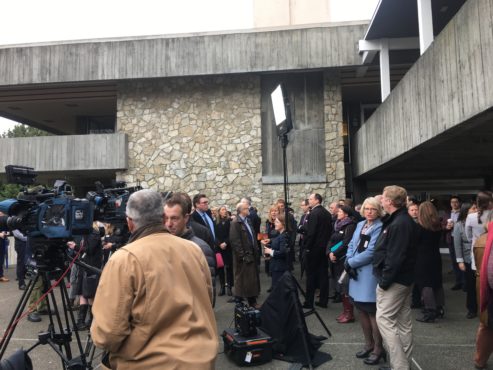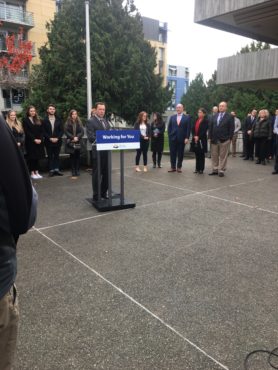The new housing project will see a 25 per cent increase in student housing at UVic

The crowd gathers in front of Cadboro Commons for the announcement. Photo by Anna Dodd, Editor-in-Chief.
On Thursday, Nov. 15, a large crowd gathered outside of UVic’s Cadboro Commons as the university and the B.C. government announced a new student housing project on campus. The project will see the construction of two residence buildings with 620 new beds and 162 replacement beds, making for a 25 per cent increase in student housing at UVic.
The space will include a 600-seat dining hall, coffee shop, and grocery store that is expected to provide a larger variety of healthy eating options on campus.
Cadboro Commons, Margaret Newton Hall, and Emily Carr Residences will be demolished to make room for the new buildings.
The announcement was made by B.C. Premier John Horgan, B.C. Minister of Advanced Education, Skills, and Training Melanie Mark, Leader of the B.C. Green Party Andrew Weaver, and UVic President Jamie Cassels.
UVic’s housing project is expected to be one of Canada’s largest Passive House certified projects.
Mark acknowledged students’ patience as Victoria’s housing market has lacked sufficient and affordable accommodation options for many years — especially for students.
Cassels was particularly jazzed about the announcement, something Mark even pointed out, calling him a “big fan” of the project.
Indeed, Cassels was uncharacteristically enthused.
“As you can tell, I’m pretty stoked,” he said.
Following Cassels’ speech, where he pointed to the importance of residences as being part of the community that contributes to student success in university, and how 75 per cent of students at UVic come outside the immediate catchment area, Weaver took to the mic.
Weaver explained that the new residence buildings will be built according to an international sustainability model called the Passive House standard, which, due to how it’s constructed, results in a very low energy building.
According to the press release provided by the university, UVic’s housing project is expected to be one of Canada’s largest Passive House certified projects.
Although the housing project is unlikely to affect many current students, the decision will have long-lasting impacts on the future of the university and the students who choose UVic for their post-secondary education.
Question period from the press was next, and the conversation quickly moved from campus housing to recent statements made by Horgan regarding proportional representation and the current referendum on electoral reform.

Jamie Cassels speaks at the gathering. Photo by Anna Dodd, Editor-in-Chief.
Horgan recently stated in another interview that the NDP caucus does not support closed lists, which has stirred up some controversy.
“Does that not sort of highlight the fact that there’s a lot of information that still has yet to be decided post-referendum and perhaps emboldens the ‘No’ side’s argument that not enough details are known upfront?” asked Keith Baldrey, Legislative Bureau Chief for Global News B.C.
Horgan disagreed. “The NDP caucus doesn’t support closed lists, the Liberal caucus doesn’t support closed lists, the Green caucus doesn’t support closed lists, so it seems to me that we can give that one a pass,” he responded. “There’s no one in the legislature that seems to think it’s a good idea so why would we proceed with it?”
“I believe that the public wants a simple answer to the question of sticking with the status quo … or embarking on a courageous course to the future, that … gets young people — many of them here today — involved in public life.”
The next question was about voter turnout thus far in the referendum, which, on the day of the press release, was at 7.5 per cent. Horgan was asked if he had a number in his mind where the outcome could lack credibility due to low voter turnout.
Horgan answered pithily, before stating he was still optimistic that turnout would increase. “Well the main number in my mind this morning was 130 housing units built over 16 years on campuses across British Columbia, and how we’ve increased that by 800 per cent over 16 months.”
Just one day later, Elections B.C. announced they were changing the way they would be updating their numbers, meaning voter turnout was now up to 18 per cent, and that they would continue to update numbers according to this new method until the final date to receive ballots on Nov. 30.
Following some questions pertaining to Vancouver transit, the gathering ended abruptly.
As for when these buildings will be constructed and completed? Cassels estimated three and a half years, speaking with the Martlet briefly after the official announcement.
According to the university’s press release, the planning stage is almost over and 2019 will be the year for finalizing designs and gaining all required municipal and provincial approvals. Construction will go from 2020 – 2024, with the first building expected to be completed for 2022.
Although the housing project is unlikely to affect many current students, the decision will have long-lasting impacts on the future of the university and the students who choose UVic for their post-secondary education.







